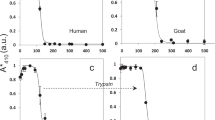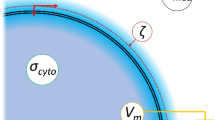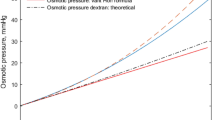Abstract
WHEN ghosts prepared from human erythrocytes by lysis in water are washed in a saline medium, sodium and potassium ions are nearly uniformly distributed across the ghost membranes1. In attempting to prepare ghosts with higher potassium and lower sodium concentrations than those of a saline medium we have found that incubation at 37° C. enables them partially to retain potassium and keep out sodium during subsequent washings and incubation.
This is a preview of subscription content, access via your institution
Access options
Subscribe to this journal
Receive 51 print issues and online access
$199.00 per year
only $3.90 per issue
Buy this article
- Purchase on Springer Link
- Instant access to full article PDF
Prices may be subject to local taxes which are calculated during checkout
Similar content being viewed by others
References
Ponder, E., “Hæmolysis and Related Phenomena” (Churchill, London, 1948).
Author information
Authors and Affiliations
Rights and permissions
About this article
Cite this article
HOFFMAN, J., TOSTESON, D. & WHITTAM, R. Retention of Potassium by Human Erythrocyte Ghosts. Nature 185, 186–187 (1960). https://doi.org/10.1038/185186a0
Issue Date:
DOI: https://doi.org/10.1038/185186a0
This article is cited by
-
Towards a Novel Spatially-Resolved Hemolysis Detection Method Using a Fluorescent Indicator and Loaded Ghost Cells: Proof-of-Principle
Cardiovascular Engineering and Technology (2015)
-
Mitochondrial toxin betulinic acid induces in vitro eryptosis in human red blood cells through membrane permeabilization
Archives of Toxicology (2013)
-
Polyphyllin D induces apoptosis in human erythrocytes through Ca2+ rise and membrane permeabilization
Archives of Toxicology (2012)
-
Membrane potentials associated with Ca-induced K conductance in human red blood cells: Studies with a fluorescent oxonol dye, WW 781
The Journal of Membrane Biology (1983)
-
General and transport properties of hypotonic and isotonic preparations of resealed erythrocyte ghosts
The Journal of Membrane Biology (1981)
Comments
By submitting a comment you agree to abide by our Terms and Community Guidelines. If you find something abusive or that does not comply with our terms or guidelines please flag it as inappropriate.



